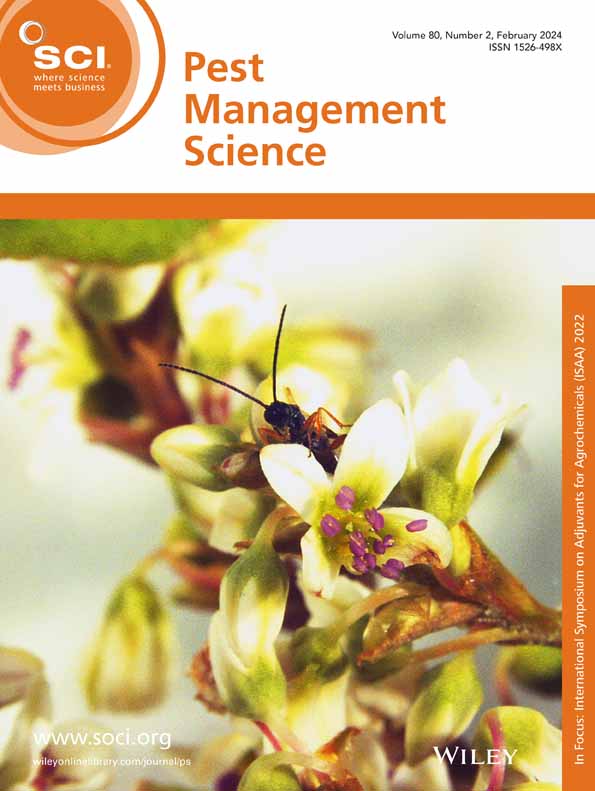用芦丁处理番茄种子产生茉莉素依赖的长期持续的对食草动物的广谱抗性启动。
IF 3.8
1区 农林科学
Q1 AGRONOMY
引用次数: 0
摘要
作为一种环境友好型作物保护策略,种子启动可以有效诱导植物对未来胁迫的免疫反应。我们之前的研究表明,用生物类黄酮芦丁处理番茄(Solanum lycopersicum)种子可以增强对韧皮部食性白蝇(Bemisia tabaci)的抗性。然而,芦丁种子处理是否具有对多种食草动物的抗性以及种子防御启动的机制基础尚不清楚。在此,我们研究了芦丁种子处理是否能增强番茄对主要食草动物的抗性,并探讨了植物激素信号在调节防御启动中的作用。结果黄芪种子对生物类黄酮芦丁具有接受性,建立了抗草食动物的启动状态,对毛虫、白蝇和蜘蛛螨的抗性长期增强。重要的是,这种诱导的抗性并不伴随着对植物生长发育的抑制。这种诱导抗性在处理过的种子中持续了至少8周,与处理过的种子中茉莉酸盐的积累有关,并依赖于茉莉酸(JA)信号通路。此外,我们证明了在芦丁处理的番茄种子中,高水平的茉莉酸盐在种子发育过程中通过转基因过表达茉莉酸生物合成基因来诱导对食草动物的防御启动的关键作用。结论芦丁处理促进了茉莉酸在番茄种子中的积累,增强了茉莉酸对番茄抗草食动物的抗性,但不影响番茄的生长。因此,利用种子启动可能为未来农业提供更好的作物保护的新途径。©2025化学工业协会。本文章由计算机程序翻译,如有差异,请以英文原文为准。
Treating tomato seeds with rutin generates jasmonate-dependent long-persisting priming of broadspectrum resistance to herbivores.
BACKGROUND
As an environmentally friendly crop protection strategy, seed priming effectively induces plant immune responses against future stresses. Our previous study demonstrated that treating tomato (Solanum lycopersicum) seeds with the bioflavonoid rutin enhances resistance against the phloem-feeding whitefly (Bemisia tabaci). However, whether rutin seed treatment confers resistance to multiple herbivores and the mechanistic basis of defense priming in seeds remain unclear. Here, we investigated whether rutin seed treatment enhances tomato resistance against herbivores representing major feeding guilds and explored the role of phytohormone signaling in regulating defense priming.
RESULTS
We found that seeds were receptive to the bioflavonoid rutin, which established a primed state for herbivore resistance, resulting in a long-term increase in resistance to caterpillars, whiteflies and spider mites. Importantly, this induced resistance was not accompanied by an inhibition of plant growth and development. This primed resistance persisted for at least 8 weeks in plants grown from treated seeds, was associated with the accumulation of jasmonates in treated seeds and was dependent on the jasmonic acid (JA) signaling pathway. Moreover, we demonstrated the key role of high levels of jasmonates in rutin-treated tomato seeds for the induction of defense priming against herbivores by transgenic overexpression of the jasmonate biosynthetic gene during seed development.
CONCLUSION
Our results conclude that rutin seed treatment promotes jasmonate accumulation in seeds and primes JA-dependent anti-herbivore defenses in tomato without cost to growth. Harnessing seed priming may, therefore, provide new avenues for better crop protection in future agriculture. © 2025 Society of Chemical Industry.
求助全文
通过发布文献求助,成功后即可免费获取论文全文。
去求助
来源期刊

Pest Management Science
农林科学-昆虫学
CiteScore
7.90
自引率
9.80%
发文量
553
审稿时长
4.8 months
期刊介绍:
Pest Management Science is the international journal of research and development in crop protection and pest control. Since its launch in 1970, the journal has become the premier forum for papers on the discovery, application, and impact on the environment of products and strategies designed for pest management.
Published for SCI by John Wiley & Sons Ltd.
 求助内容:
求助内容: 应助结果提醒方式:
应助结果提醒方式:


